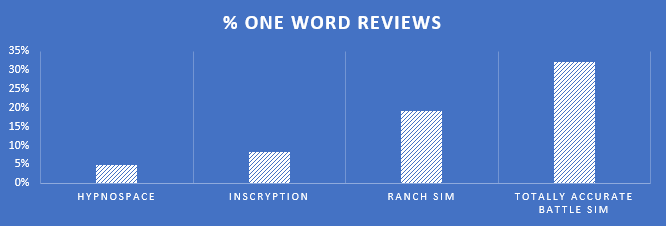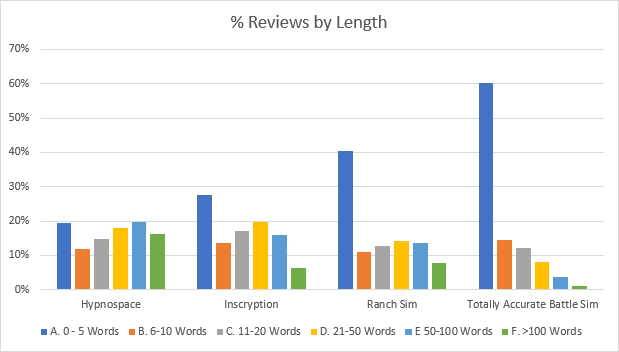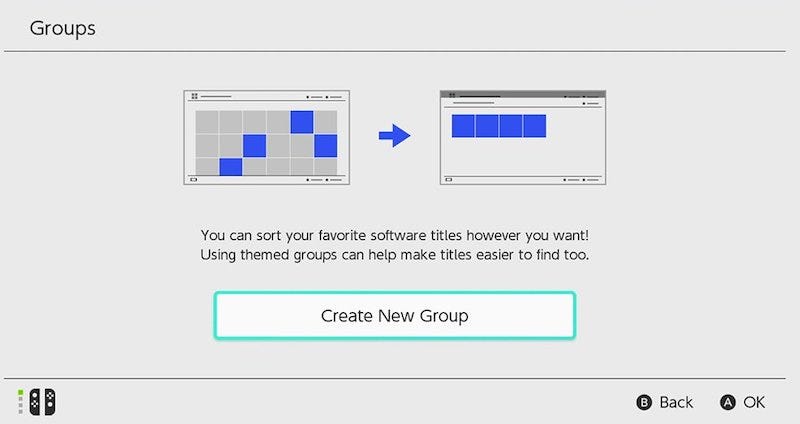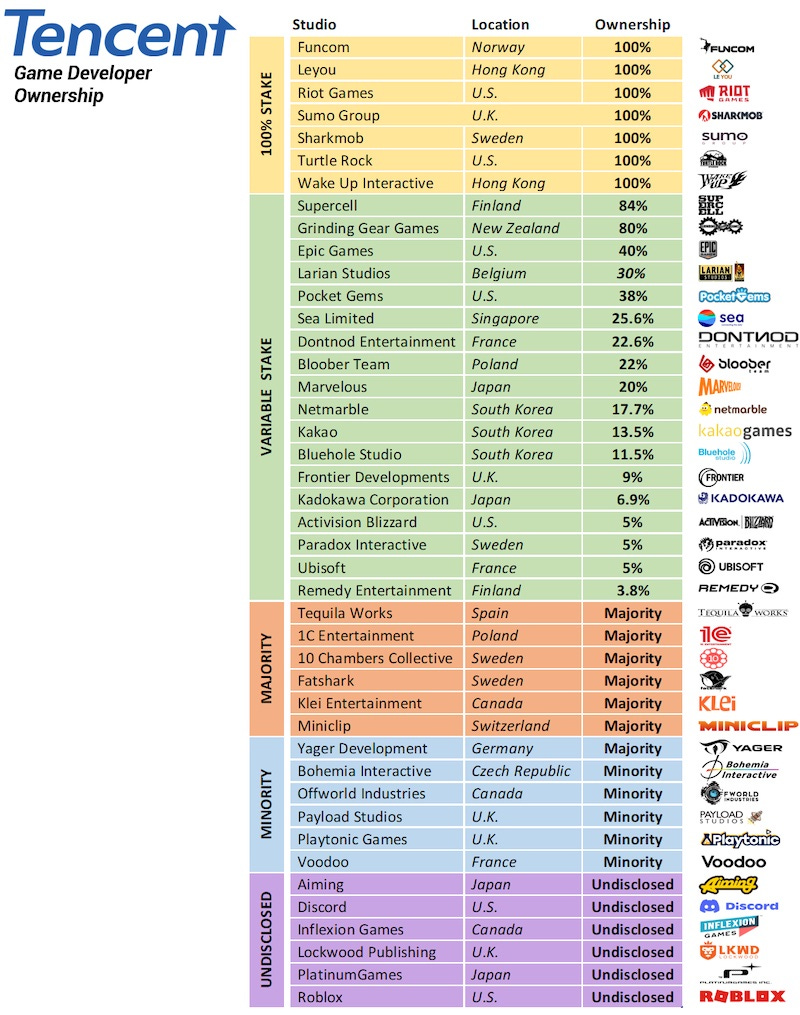Hidden discovery insight? Analyzing player review word length!
Publikováno: 23.3.2022
There's always more to learn from data.
[The GameDiscoverCo game discovery newsletter is written by ‘how people find your game’ expert & company founder Simon Carless, and is a regular look at how people discover and buy video games in the 2020s.]
Welcome to your Wednesday, and the second free GameDiscoverCo newsletter of the week. We’re busy busy busy here - preparing an exciting new expansion(tm) to roll out to everyone all soon (hint: it’s not text!), while keeping up on that good data and news.
If you dig what we’re doing here, btw, please grab our current 30% off the first year of GameDiscoverCo Plus offer. You help support our work, get Discord, eBook, and bonus newsletter access & we get to keep sending great free content out to the masses!
Takeaways for Steam players from review length?
It’s always great when you work with someone who takes on your ideas and enhances them. Such is the case with Steve Stopps & James Clements of Excalibur Games, a newer GameDiscoverCo client whom we’ve been working with to hone the ‘long tail’ of their Steam games.
Along the way, we were looking at the audience of one of their more successful games. I made a gut comment that its audience might trend casual, based on the shorter word length of its Steam reviews. This wasn’t a scientific remark. But Steve went away and did a bunch of custom scraping/SQL analysis, and - we think - proved it out.
We wanted to present the results - and the methodology - to the public. Therefore, Steve did the work again with four titles that we picked, in ascending ‘casualness’ order. They were:
nerdy-awesome ‘90s Internet simulator Hypnospace Outlaw
hit deckbuilding roguelite & lots more Inscryption
another Excalibur-published title, popular open-world sim Ranch Simulator
hilarious sandbox physics-’em-up Totally Accurate Battle Simulator.
Firstly, here’s the percentage of one-word reviews for each of the games:
So there’s quite a big difference here! Steve then went and subdivided the game’s reviews nicely by word ranges, and got the following results:
It really is a little surprising to see such big differences in word count - looks like we picked the right range of games to compare. Still, when we say ‘more casual’, what do we actually mean here?
Are we just presuming that because people left shorter reviews, they are more casual Steam players? Well, we think that’s likely. But Steve grabbed supporting data - for example, the average number of Steam games owned by anyone reviewing that game:
We can also go even further, and look at the average number of Steam games owned by those leaving shorter - or longer - Steam reviews for those particular titles:
This certainly seems to indicate that more ‘casual’ Steam players leave shorter reviews, and have less games in their library. But even individual games can have quite different ranges of owners between brief reviews and long reviews. Super interesting!
Oh, and a bonus chart - this is the average play time (in minutes!) at the time of review, based on the word length of a game’s Steam review. Remember, average skews higher than median, which is why some of these numbers seem large:
Anyhow, I do think you might make different discovery or marketing decisions for games, based on info like this. It affects the kind of information you might put on its Steam page, how you think about your player personas, and so on.
There’s more you can do around Steam reviews, of course. Myself and Steve also discussed sentiment analysis, which he’s looked at, and can also create some entertaining word clouds. But that’s for another time. And thanks to him for the work!
What people look at when they fund your game..
Late last year, Nick Suttner - former Oculus/PlayStation dev relations person, nowadays helping out Panic on Playdate publishing & making his own games - had a super useful Twitter thread that we wanted to reprint and comment on.
Nick said: “RE: getting your videogame (or maybe anything?) funded - I firmly believe that most people are asking themselves these three questions (in order) when you're pitching them:
Am I personally excited about this game? Even people managing a larger portfolio for their employer need to first give a shit themselves, if they're going to become your champion to their team. [Nick had a talk about this at GDC in 2019, embedded above.]
Can the team who's pitching me pull it off? An amazing idea doesn't mean much if it doesn't seem like the team pitching it actually has the experience/skill to make it, or isn't asking for enough budget to do so.
Can we - publisher/platform/fund - afford to take the risk involved on this game? This is largely based on forecasting sales versus available funding bucket versus game budget. And that one is mostly out of your hands, as the dev.
If people can't get #1, they're not going to bother asking themselves #2; but if both are a go, they'll try hard to make #3 work. There are a lot of other factors too, but I feel like internalizing this chain of questions might be important.”
This may sounds, well, a little bit basic, on the face of it. But everyone should think about this more methodically. And I wanted to drill down on one particular detail - ‘great game concept’ is an awesome start, but #2 - ‘can they ship it and make it successful?’ is also super important.
We look at a lot of pitch decks from small/medium developers in client work. And I often find myself reverse engineering the ‘can they ship games?’ question from public information which isn’t in the pitch. Which is kinda… weird.
So - if you’ve shipped games and they’ve done decently, put a slide in there showcasing that! Beyond your financial ask & creative concepts, instilling confidence that you’ll put out the product (more or less) on time and on budget is super important.
Finally, going back to the ‘platforms are people too’ motif - game platform relations are only on the rise, importance-wise. Establishing those person-to-person relationships as a reliable, high quality partner to the big platforms? It’s getting more vital again.
The game discovery news round-up..
OK, finishing things up a little early for free newsletters this week, since I have to perambulate across to San Francisco and walk around in the sweltering* (*for SF) spring heat chatting to GDC-ish people, hurrah:
We talked about Epic’s generous Fortnite-related donations to Ukraine, and that Itch.io bundle, but also wanted to highlight the Humble ‘Stand With Ukraine’ bundle, which has scores of devs participating and has already raised more than $13 million for Ukraine relief. Kudos to all those involved…
Yes, the latest firmware update for Nintendo Switch has revealed folders, folders, folders - fine, Nintendo calls them ‘groups’ (above) and it’s actually just a new way to sort with a tab of groupings, not folders you can move items into forevermore. But hey! Much hilarity online that it’s taken a few years to introduce this, but better late than never, I guess?
Here’s an interesting piece on how “coding wizardry is what happens when 'Elden Ring' on a Steam Deck can run better on Linux than Windows.” It talks to Valve’s Pierre-Loup Griffais, who explains: “we have access to not only the entire underlying operating system but also its graphics APIs and driver subsystems. That access gives us more opportunity to optimize the game experience than if we were responsible for a single component, and reliant on vendors for the other pieces.”
In ‘further firmware patches’ news, Sony just rolled out PlayStation 5 and PlayStation 4 updates, including “the ability to create or join Open and Closed Parties on PS5 and PS4 consoles”, and is teasing Variable Refresh Rate (VRR) for PS5, which is out soon-ish and “enhances visual performance for PS5 games by minimizing or eliminating visual artifacts, such as frame pacing issues and screen tearing.” PSN is down following the patch launch, though?
Notable Quest news: Meta just announced parental supervision tools, “which will begin rolling out to all Quest headsets over the coming months” and includes a parent dashboard, and an ‘Ask To Buy’ request for teens; the most popular Quest apps in the last month get poked at by RoadToVR, including the runaway hit Blade & Sorcery: Nomad.
Biz/marketing agency Metagether notes: “Benchmarking is an essential part of pre-production marketing. Let’s dive into the process and its benefits for video games.” Hard agree that you should do a serious job of this - we prefer using a Steam tag/tag combination to find similar PC games, rather than the ‘More Like This’ box, but it’s definitely a ‘good idea’.
This whole ‘Steam coming to ChromeOS notebooks’ thing is pretty interesting, but it’s been a bit confusing. First it was announced, then it was here but wasn’t, and now “an alpha version of Steam is finally available for Chrome OS users with specific machines to test, as long as they’re willing to put a beta OS on their computer.” Higher-end machines only, but we’ll see where this goes!
Web3 stuff, sorry: Yuga Labs (Bored Ape Yacht Club) raises $450 million (!) and teases Otherside, “an NFT-based MMORPG game where players can use their NFTs as playable character”, ugh; FTX has bought Good Luck Games, creators of F2P autobattler Storybook Brawl, which is getting review bombed on Steam due to its new owner.
No doubt you keep up on the Xbox Game Pass and PlayStation Plus ‘new games!’ news. But further down the game subscription spiral, we’re here to tell you that Stadia Pro is still trucking, with April picks including Deliver Us The Moon and YS IX: Monstrum Nox, and Netflix Games just announced new ‘free’ mobile titles for March, including This Is A True Story (Frosty Pop), Shatter Remastered (PikPok), and Into The Dead 2: Unleashed (PikPok).
Finally, with Tencent reporting $32.4 billion in game revenue in 2021 (?!), was chatting to Derek Strickland, Tweak Town’s tech/games news editor, following Polygon’s longform piece on Tencent. Derek provided us this exclusive consolidated infographic on Tencent’s total reach in the video game space, which is… impressive:
Feel free to ping us collectively if he’s missing any studios or details. But… that’s quite a lot of companies already, isn’t it?
[We’re GameDiscoverCo, an agency based around one simple issue: how do players find, buy and enjoy your premium PC or console game? We run the newsletter you’re reading, and provide consulting services for publishers, funds, and other smart game industry folks.]






